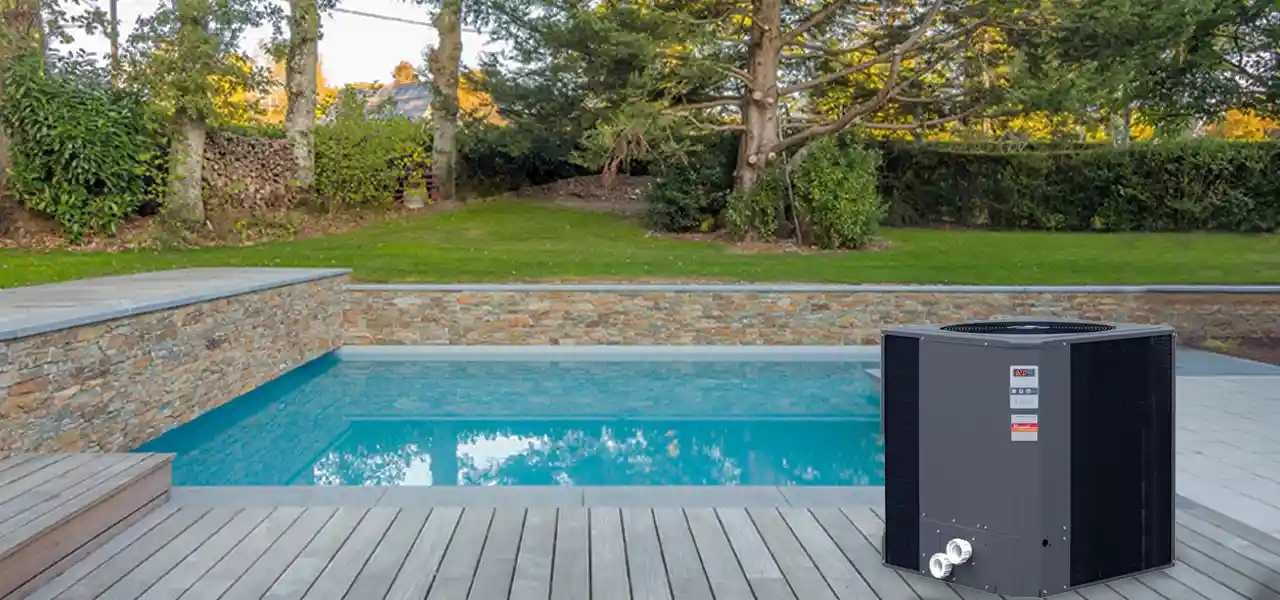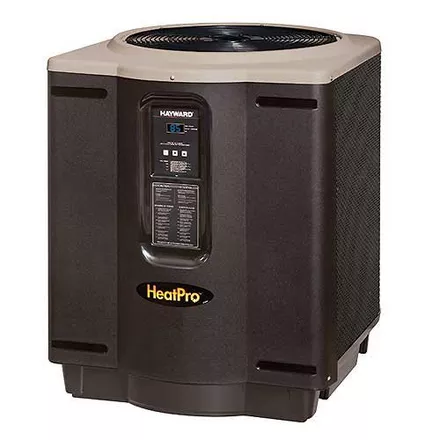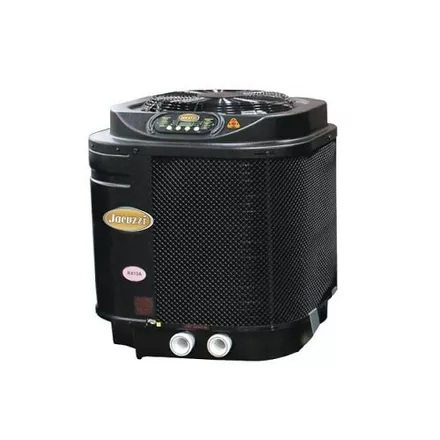10% Off Sitewide Sale + Free Shipping No Minimum*

Swimming Pool Heat Pumps: A Buyer's Guide
Swimming pool heat pumps offer warm pool water at a fraction of the cost of gas pool heaters, and unlike solar heaters, continue to heat the pool during cloudy, rainy periods.
Advantages of using a heat pump
Pool heat pumps work similar to a home heat pump. It acts like a reverse air conditioner, removing the ambient temperature in the air, with the use of an evaporator coil, liquid refrigerant and a compressor. The heat from the outside air is transferred to the pool water moving through the heat pump.
- No emissions and very low energy use
- Reliable heater, requires no maintenance
- No dangerous gas or flames used
- Easy to install, operate and troubleshoot
- Highly efficient, cheap to operate.
This blog will help you select the best pool heat pump for your pool size and usage patterns, and answer some questions about heat pumps along the way:
Sizing a heat pump

Pool heat pumps are typically matched to the number of gallons in your pool. If you don't know or aren't sure how many gallons you have, measure your pool, and use this pool volume calculator tool.
Some heat pump manufacturers don't list the gallons, but list their heaters in terms of the BTU output. Most models are in the range of 50K (50,000) BTU's - to 125K BTU's.
50K BTU heat pumps are meant for small pools, or aboveground pools, under 12,000 gallons. It will work on larger pools, but heating will be slow and total temperature rise may not be what you desire.
You'll need to consider pool size and the desired temperature change when selecting a heat pump for your swimming pool. Other factors, such as the average air temperature, humidity and wind speeds, will also influence a heat pump's ability to warm the pool water. Figuring on a temperature increase of 1-1.25 degrees per hour, you can use the following equation to get an approximate heat pump BTU requirement:
(Surface Area) x (Temperature Increase) x 12 = (Minimum BTU Needed)
For example, we'll use a rectangular pool 14 ft. wide by 28 ft. long. During the coldest month of use, the pool owner wants to increase the water temperature by around 20 degrees Fahrenheit.
(14 x 28) x 20 x 12 = 94,000+ BTU
BTU Guidelines
If you happen to know the volume of your pool in gallons, you can also follow this general guideline for heat pump BTUs:
| Pool Volume | Heat Output |
|---|---|
| 10,000 gal. | 50,000 BTU |
| 15,000 gal. | 90,000 BTU |
| 20,000 gal. | 120,000 BTU |
| 25,000 gal. | 140,000 BTU |
Heat pumps max out around 135,000 to 150,000 BTU, so larger pools will take longer to heat. It's important to purchase a properly sized unit in order to maximize energy savings. Using a solar pool cover can also help reduce heat loss and boost efficiency.
The larger the BTU output, the faster the heating (still slow by gas pool heater standards) - and the greater temperature rise the pool heat pump can achieve. A nice sized heat pump can bring the pool up 30 degrees (or from 50 to 80 degrees).
Another factor that could affect the size of heat pump that you buy; if you have high winds and no pool cover, you will suffer from a great deal of heat loss off the top of the pool. If you do have wind blocks and/or an automatic pool cover, you could potentially buy a smaller heat pump.
Selecting a heat pump brand

With so many on the heat pump bandwagon, there are a lot of brands to choose from. Many of the names you may not recognize, like TropiCal and AquaCal. These companies are the originators of pool heat pumps, selling thousands throughout the 80's and 90's. As sales increased, big brands like Hayward and Pentair took notice, who are now making pool heat pumps as well.
To make it easier to choose from, we list 6 different pool heat pump models, from 4 manufacturers. Prices vary according to the features installed on these different models. Some of the most popular options out there that all models have is:
- Titanium Heat Exchanger
- Thermoplastic jacket or exterior
- Digital display, electronic controls
- Environmentally friendly R410A refrigerant
Some models will have more advanced diagnostic indicators (idiot lights), a super-quiet Scroll compressor, or a more compact design. Warranty is another point of differentiation between our 6 models of heat pumps. Finally, the high end pool heat pumps have the ability to also cool the pool, in the event that summer heat brings the pool water to unbearable temperatures!
Installing a heat pump
There's not much difference in installation methods among our pool heat pumps. There are some size considerations, so if you have a smaller space, look to the product dimensions in the brochure or the owner's manual (linked from our heat pump pages).
All heat pumps will need to be installed on a level platform or slab. You cut the pipe after the filter and any chlorinator, then connect the pool plumbing in and out of the heat pump. Heat pumps require a 30-60 amp breaker, depending on their BTU output size.
Your heat pump installation may require bringing more power to the equipment pad, or if you're lucky, you have enough room left to add the required breaker size to the panel. To be safe, use a qualified electrician to perform the electrical hook-up on your new heat pump.
Pool Heat Pump Buyer's Guide
Aqua Cal
One of the oldest and largest manufacturers of heat pumps. Aqua Cal does not make any other products besides heat pumps for pools in both residential and commercial applications. Their heat exchanger is titanium. Aqua Cal has an easy to read digital display, dual thermostat and whisper quiet fan motor. The thermostat has a lockout option, which prevents anyone from adjusting the pool temperature.
Aqua Pro
The AquaPro heat pump has a titanium heat exchanger with a 5 yr. warranty on the heat exchanger. Most of the units have a digital display with a dual thermostat. The housing on the heat pump is very durable and is weather resistant. Aqua Pro is one of the leaders in pool heat pumps, and one of the first manufacturers in Florida.
Pentair UltraTemp
The UltraTemp is Pentair's original heat pump with a titanium heat exchanger to help prevent and protect against chemical corrosion. The cabinet on the UltraTemp is weather resistant and will help ensure optimal performance during any climate. Available in three sizes, and comes in a heat/cool model to both heat and cool the pool, and comes with many advanced features and benefits.
Hayward HeatPro
Hayward purchased EUS in 2003, and added the Heat Pro, which has a titanium heat exchanger to help prevent from chemical damage and also Hayward Quiet technology built into their heat pump. The compressor and fan blade helps reduce noise. Hayward Heat Pro has an Ultra Gold corrosion resistant evaporator coil which helps provide excellent durability even in coastal environments.
Raypak Classic Series
These heat pumps feature robust construction, and full featured design elements. Easy-to-use digital controller and simple water line hook ups make operation and installation a snap! ETL Listed and AHRI Certified. We also carry the Raypak Heat Cool Heat Pumps, to allow you to heat or cool the pool water, as needed.
TropiCal
An economical and environmentally-friendly way to heat your pool. Using titanium heat exchangers and TropiCal’s patented counter-flow water management system, this pump harnesses the power of its sealed ventilator motor. Microprocessor controlled auto defrost keeps the TropiCal running even when temps dip into the 40s.